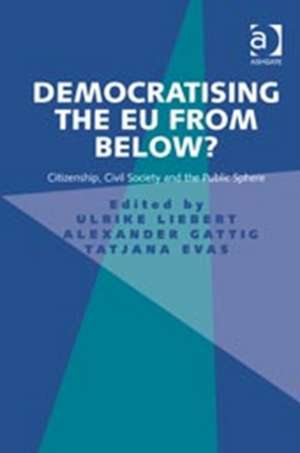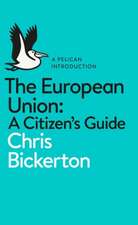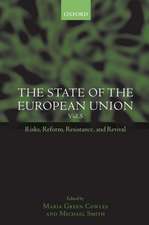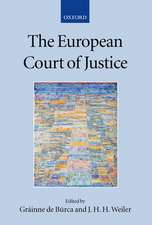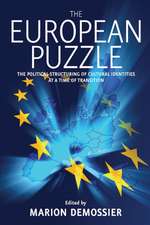Democratising the EU from Below?: Citizenship, Civil Society and the Public Sphere
Autor Ulrike Liebert, Alexander Gattigen Limba Engleză Hardback – 22 iul 2013
Preț: 822.01 lei
Preț vechi: 1141.71 lei
-28% Nou
Puncte Express: 1233
Preț estimativ în valută:
157.34€ • 170.97$ • 132.25£
157.34€ • 170.97$ • 132.25£
Carte tipărită la comandă
Livrare economică 21 aprilie-05 mai
Preluare comenzi: 021 569.72.76
Specificații
ISBN-13: 9781409464136
ISBN-10: 140946413X
Pagini: 220
Dimensiuni: 156 x 234 x 19 mm
Greutate: 0.57 kg
Ediția:New.
Editura: Taylor & Francis
Colecția Routledge
Locul publicării:Oxford, United Kingdom
ISBN-10: 140946413X
Pagini: 220
Dimensiuni: 156 x 234 x 19 mm
Greutate: 0.57 kg
Ediția:New.
Editura: Taylor & Francis
Colecția Routledge
Locul publicării:Oxford, United Kingdom
Recenzii
'More Europe is the answer most frequently articulated by elites in response to the current crisis of the Euro. This "from above" strategy has served several times in the past to drive the integration process forward, but will it suffice in the present context? This collection of essays suggests not. The impact of EU policies has become so extensive and controversial that it has attracted increased media attention, penetrated organizations of civil society, compelled political parties to take conflicting positions and mobilized citizens to act in novel ways "from below" - and much of this has been against rather than for more Europe. Scholars and politicians interested not just in understanding this rise in resistance, but also in acting to incorporate it within a new strategy for legitimating the emerging Euro-polity will find important insights in this book.’ Philippe C. Schmitter, European University Institute, Italy ’By exploring how European citizens, civil society, the media, political parties, parliaments and courts engage with the problems of democracy in the EU, this book sheds new light on an inconclusive constitutional order. In the face of the present financial, economic and political crisis, the authors provide much appreciated knowledge of the more fundamental questions of EU’s viability as a citizens’ union.’ Erik O. Eriksen, University of Oslo, Norway
Notă biografică
Ulrike Liebert is Professor of Political Science, Jean Monnet Professor of European Politics, director of the Jean Monnet Centre for European Studies at Bremen University where she has co-directed the section ’European integration’ of the Bremen International Graduate School for Social Sciences. Alexander Gattig is a lecturer at the Department of Sociology’s Social Science Methods Centre at the University of Bremen. His research interests are in the area of social stratification, political sociology and rational choice theory. Tatjana Evas is an Associate Professor at the Tallinn Law School, Estonia and currently working as a researcher at the European University Institute. Her research interests are in the area of European constitutional law, judicial politics, legal theory and equality law.
Cuprins
Chapter 1 Democratising the EU from Below? Citizenship, Civil Society and the Public Sphere in Making Europe’s Order, Ulrike Liebert; Chapter 2 Still ‘between Eros and Civilisation’? Citizens, Courts and Constructing European Citizenship, Tatjana Evas, Ulrike Liebert; Chapter 3 Disaffected Citizens? Why People Vote in National Referendums about EU Treaty Reform, Alexander Gattig, Steffen Blings; Chapter 4 Ignorant Gatekeepers against the EU? National Political Part Ies in European Political Communication, Kathrin Packham; Chapter 5 Watch-dogs that Cannot Bite? New National Parliamentary Control Mechanisms under the Lisbon Treaty, Aleksandra Maatsch; Chapter 6 A Panacea for Democratic Legitimation? Assessing the Engagement of Civil Society with EU Treaty Reform Politics, Petra Guasti; Chapter 7 Still “Second Order?” Re-examining Citizens’ Voting Behaviour in European and National Elections 1999–2009, Alexander Gattig, Ewelina Riekens, Ulrike Liebert;
Descriere
This original contribution to the debate about democratic citizenship vis-Ã -vis the challenges of economic globalization and European political integration presents critical explorations of different fields of direct, representative, participatory and deliberative democratic citizenship practices that affect the transformation of Europe.
